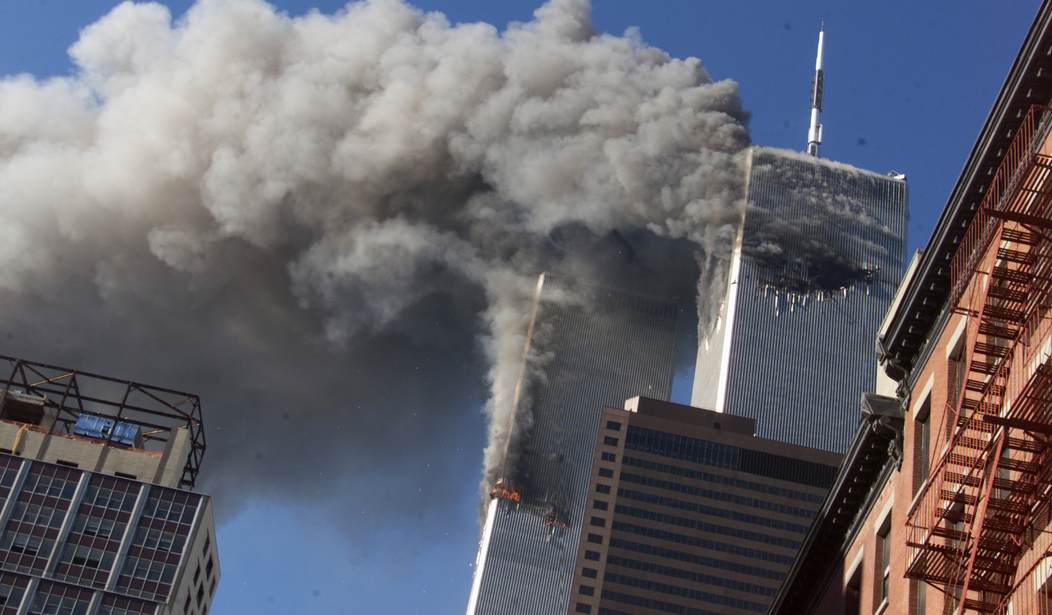On the 20th anniversary of the worst terrorist attack in history, I wrote a RedState piece titled, September 11, 2001: ‘Michael, This Is the Beginning of WW III’, which I’m going to excerpt on this 21st anniversary of the attack that changed America forever. As with the assassination of President John F. Kennedy on November 22, 1963, chances are that those who are old enough to remember that day also remember what they were doing when they first heard the breaking news from Dallas.
It was a beautiful sunny morning on Monday, August 27, 2001. I was aboard a Delta flight from Indianapolis to New York City on a business trip with a colleague. As we flew up the Hudson River, my colleague, in the window seat, nudged me, pointed out the window, and said “There’s the World Trade Center,” which was always a sight to behold from that view. Fifteen days later, the World Trade Center would be gone.
It was also a beautiful sunny morning on Tuesday, September 11, 2001, in Indianapolis. I was sitting at my desk in my office, engrossed in a financial plan I was working on for a new client when the phone rang suddenly — in the respect that it snapped my mind out of the asset allocation model I was debating with myself. It was my wife. Before she said a word, I sensed something was wrong.
“Turn on the TV — a plane just flew into the World Trade Center,” she said, obviously concerned, yet not nearly as much as she would be the next time she called. I quickly gathered up my crew, went into the conference room, and turned on the TV, as we sat around the conference table watching in disbelief.
Then the second plane hit the second tower and in a nanosecond, we knew what had happened — and we were pretty sure it had just changed everything — maybe forever. Then the phone rang, again.
This time, my wife, fighting back tears, was afraid. Not panicky scared, or out-of-control scared; more of a “dreading what’s to come” fear. “Michael,” she said, “this is the beginning of WW III.”
One of the options I was considering for the fixed-investment portion of the portfolio I was working on was a product from the financial management firm, Cantor Fitzgerald, whose headquarters were located in the North Tower. Every Cantor employee who came to work on 9/11 was killed in the attack. Our Cantor rep visited our office earlier that year. I still have his 1 World Trade Center business card.
As with all significant traumatic events in our lives, it seems inconceivable that 9/11 happened all that long ago. Even sometimes harder to realize is there’s a new generation of Americans with no memory of that horrific day and the national response that followed.
President George W. Bush led the grieving nation and its response in the uncertain days following the attack. Three days after the towers fell, the president defiantly stood atop the Ground Zero wreckage with a bullhorn in his right hand and his left arm around the neck of retired firefighter Bob Beckwith, who had traveled to Ground Zero to help with the rescue operation. Beckwith was asked to help guide Bush to the top of the wreckage, but “W” hung onto his neck while he spoke, impromptu:
I can hear you, the rest of the world hears you, and the people who knocked these buildings down will hear all of us soon!
The presidential candidate from Texas who sought the office of the nation’s presidency in peacetime became a wartime president, in the blink of an eye, through no choice of his own.
"I can hear you, the rest of the world hears you, and the people who knocked these buildings down will hear all of us soon!”
A look back at Pres. George W. Bush speaking to first responders just three days after 9/11: https://t.co/zMQepY31TT pic.twitter.com/eyY13m4pMG
— ABC News (@ABC) September 11, 2020
In the days and weeks that followed, Americans proudly and defiantly stood as one, not unlike George W. Bush and Bob Beckwith stood atop the Ground Zero wreckage. In the early years that followed, Independence Day, Memorial Day, Veterans Day, and the Declaration of Independence, among others, took on new meanings to Americans who had never viewed such events and documents as they now did.
Even national politics temporarily cast aside its partisanship, with George W. Bush achieving the highest presidential job approval rating ever measured by Gallup for his Global War on Terrorism and handling of the presidency. A CNN/USA Today/Gallup poll, conducted September 21-22, found that 90 percent of Americans approved of Bush’s overall job performance.
On 9/11/2001, America’s knees were buckled and bent— but we never broke. A degree of innocence and assumed — almost complacent — security, and invincibility was lost. Forces far more capable than Osama bin Laden and al-Qaeda ever dreamed of becoming continue to expand their capabilities across multiple levels, including economically, militarily, and through increasing regional influence.
Domestic forces within America, intent on doing what bin Laden and the Islamist terrorists could not do, continue to rip away pieces of our beloved country as we know it, from attempting to reprogram the morals of our children and desensitize them to perversions once unthinkable, to opening our southern borders to God knows who, are defended if not outright supported by national political figures, left-wing media outlets, public school systems, and within the no-longer-hallowed halls of academia
If 9/11 occurred in 2022 instead of 2001, how would we respond to the worst terrorist attack in history on American soil, and in the days, weeks, and months that followed? Would the outcome be the same? Or would the finger-pointing and political expedience begin, like never before?
Sadly and reluctantly, I have serious doubts.















Join the conversation as a VIP Member